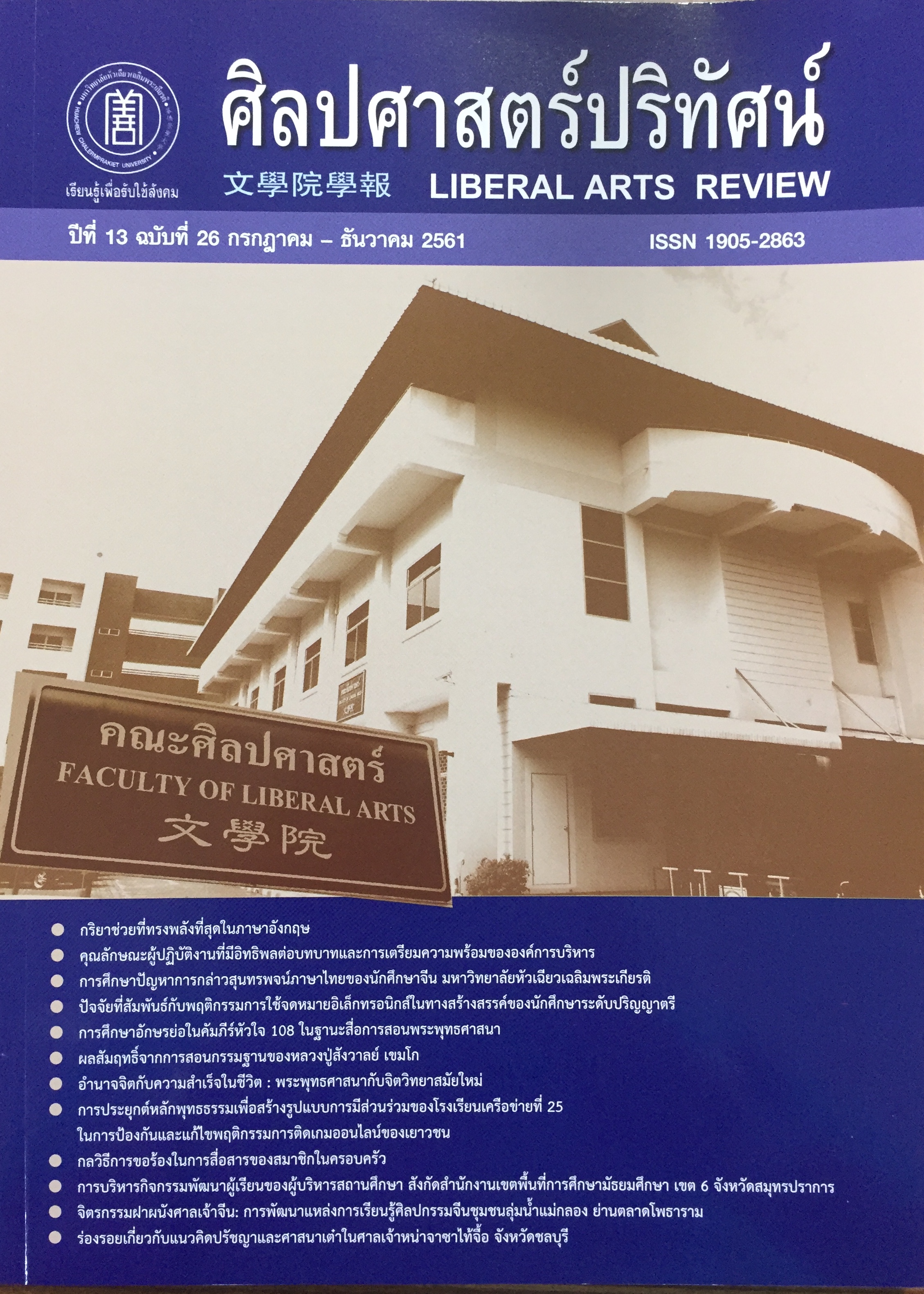The Request Strategy in Communication of Family Members
Keywords:
request, nuclear family, communicationAbstract
This research studies of the request strategy in the communication of family
member that is important in daily life. The purpose is to study the request strategy
types of a nuclear family consisting of parents and children by setting up a scenario for
the parents to give requests to the children to do something and the social factors of
the speaker’s sexuality that affected to the listener. Data were collected by open-ended
questionnaires.
The results found that there are 10 request strategies in family communication
which are; 1) explanation about advantage and disadvantage, 2) suggestion, 3) question,
4) requirement, 5) stipulation, 6) goodwill expression, 7) alternative offer, 8) rationalization,
9) sarcasm, and 10) Blame. In the relationship side of parents who used the most
explanation about advantage and disadvantage and suggestion in the request strategies,
there was not much difference. In the other strategies, the researcher found that the
fathers usually used the strategies of requirement and alternat ive offer more than
mothers. Then the mothers usually used the strategies of questi on, stipulation,
rationalization, goodwill expression, and sarcasm in descending order of frequency more
than the father. Likewise, the fathers used blame strategy less than the mothers.
References
2551. กรุงเทพมหานคร : โครงการวิเคราะห์สุขภาวะของเด็กและวัยรุ่น.
ศิริรัตน์ คุปติวุฒิ. (2545) จิตเวชเด็กและวัยรุ่น. กรุงเทพมหานคร : ชมรมจิตแพทย์เด็กและวัยรุ่น.
สถาบันการพลศึกษา วิทยาเขตชุมพร. (2560) “หน่วยที่ 6 ประชากรและกลุ่มตัวอย่าง วิธีการเลือกกลุ่ม
ตัวอย่าง” [ออนไลน์] แหล่งที่มา : http://www.ipecp.ac.th/ipecp/cgi-binn/ research/ program/
unit6/content3.htm (20 ตุลาคม 2560)
สุจิตลักษณ์ ดีผดุง. (2552) วัจนปฏิบัติศาสตร์เบื้องต้น. พิมพ์ครั้งที่ 2. นครปฐม : สถาบันวิจัยและ
วัฒนธรรมเพื่อพัฒนาชนบท มหาวิทยาลัยมหิดล.
สุจิตลักษณ์ ดีผดุง และ สุขุมาวดี ขำหิรัญ. (2548) การขอร้องและการปฏิเสธการขอร้องในภาษาไทย.
นครปฐม : สถาบันวิจัยและวัฒนธรรมเพื่อพัฒนาชนบท มหาวิทยาลัยมหิดล
สุวรรณา เรืองกาญจนเศรษฐ์ และคณะ. (2552) วิเคราะห์สุขภาวะเด็กและวัยรุ่น วัย 13-18 ปี.
กรุงเทพมหานคร : ราชวิทยาลัยกุมารแพทย์แห่งประเทศไทย และ สมาคมกุมารแพทย์แห่งประเทศไทย.
อาภาภรณ์ เดชวิจารณ์กิจ. (2547) การเปรียบต่างกลวิธีการขอร้องในภาษาญี่ปุ่นและภาษาไทย.
วิทยานิพนธ์ อ.ม. (สาขาภาษาและวรรณคดีญี่ปุ่น) กรุงเทพมหานคร : บัณฑิตวิทยาลัยจุฬาลงกรณ์
มหาวิทยาลัย.
Blum-Kulka, Shoshana and Elite, Olshtain. (March 1984) “Requests and apologies : A crosscultural
study of speech act realization patterns (CCSARP)” Applied Linguistics. 15
(3) p. 196-213.
Brown, P. and Levinson, S. C. (1978) “Universals in language usage : Politeness phenomena”
In E.N. Goody, Ed. Questions and Politeness : Strategies in Social Interaction. pp.
56-289. Cambridge : Cambridge University Press.
Day, H. I., Berlyne, D. E. and Hunt, D. E. (1971) Intrinsic Motivation : A New Direction in
Education. Toronto : Holt, Rinehart and Winston.
Dorothy, S. B. and Raphael, J. B. (1996) Family Therapy : A Systematic Integration. Boston
: Allyn and Bacon.
Erikson, E. (1963) Identity and the Life Circle. New York : International Universities Press.
Freud, A. (1965) The writings of Anna Freud, volume 6. Normally and Pathology in
Childhood: Assessment of Development. Madison : International University Press.
Jatuporn Khahua. (2003) A study of Speech Act Patterns of Requests in Thai
Society. Thesis M.A. (Linguistics Faculty of Graduate Studies) Nakhonpathom :
Graduate School Mahidol University.
Searle, J. R. (1969) Speech Acts. Cambridge : Cambridge University Press.
Searle, J. R. (1985) “Indirect Speech Acts” In A. P. Martinich, Ed. The Philosophy of
Language. p. 171-185. Oxford : Oxford University Press.
Downloads
Published
How to Cite
Issue
Section
License
บทความที่ได้รับการตีพิมพ์เป็นลิขสิทธิ์ของวารสารศิลปศาสตร์วิชาการและวิจัย
ข้อความที่ปรากฏในบทความแต่ละเรื่องในวารสารวิชาการเล่มนี้เป็นความคิดเห็นส่วนตัวของผู้เขียนแต่ละท่านไม่เกี่ยวข้องกับมหาวิทยาลัยหัวเฉียวเฉลิมพระเกียรติ และคณาจารย์ท่านอื่นๆ ในมหาวิทยาลัยฯ แต่อย่างใด ความรับผิดชอบองค์ประกอบทั้งหมดของบทความแต่ละเรื่องเป็นของผู้เขียนแต่ละท่าน หากมีความผิดพลาดใดๆ ผู้เขียนแต่ละท่านจะรับผิดชอบบทความของตนเองแต่ผู้เดียว




